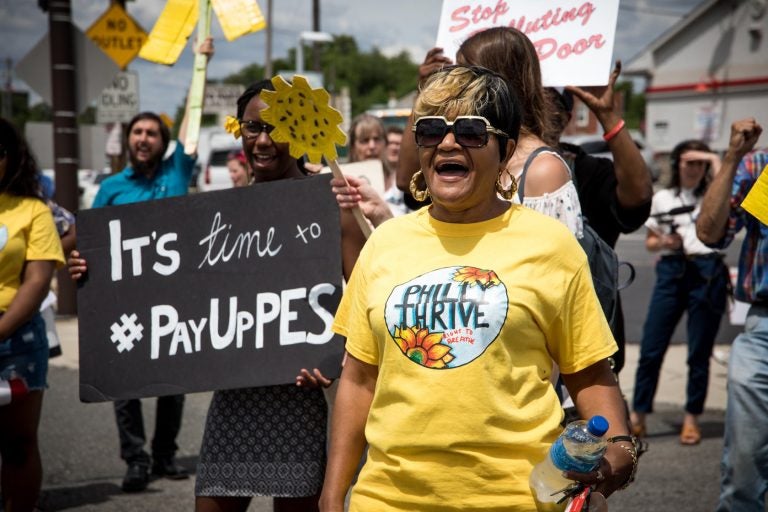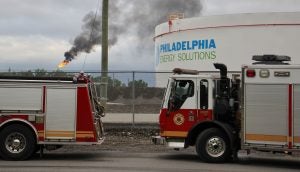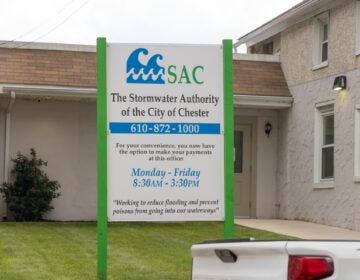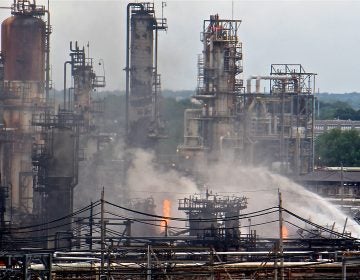From Catastrophe to Closure: A vision beyond fossil fuels
As the fireball raged over South Philadelphia last week, over one million residents in our region faced potentially life-threatening circumstances.

Protestors gathered at the oil refinery in South Philadelphia. (Rachael Warriner)
This story originally appeared on PlanPhilly
As the fireball raged over South Philadelphia last week, over one million residents in our region faced potentially life-threatening circumstances. We all held our collective breath until we learned that the dangerous chemical, hydrofluoride, was not in the explosion. We averted a mortal disaster thanks to the brave actions taken by the refinery workers, who put their lives on the line. Avoiding catastrophes should not be a day-to-day worry of residents or workers. Yet, the more we rely on fossil fuels and let corporate greed and malfeasance dictate our economy, the closer we are to the brink of such occurrences.
But we have an opportunity to change this.
Today, Philadelphia Energy Solutions (PES) —owned by private equity firms like the Carlyle Group and creditors like Credit Suisse and Barden Hill—announced that it will shut down the refinery for good. This is welcomed news for our communities and families in South Philadelphia. Our families have suffered from corporate negligence and failed city oversight as PES violated our air, water and land. Every week, we brought our children to the hospital for asthma due to the poor air quality. Each year, we have seen loved ones die premature deaths to unexplained cancers. And every winter, many of us struggle to afford energy to heat our homes, despite the glut of heating oil that was produced next door at the refinery. For years, our communities were a sacrifice to corporate profits. But we are not the only ones who have suffered.
The very same workers who put their lives on the line to ensure that the fire would not spread, are left in the lurch. With the announcement of the refinery closure, the workers are now out of a job—no transition plan, no support, no security. That’s 700 United Steel Workers and nearly 300 contracted workers—all left behind because PES and its private equity firms and creditors get to walk away—writing this off as an expense on their balance sheet.
We say no more.
Corporations have poisoned our communities and exploited its workers without any accountability. That ends today—they must pay up. They cannot be allowed to walk away without any commitment to cleaning up the refinery, investing in community health and providing security for the workers. Remediating the refinery will require a huge investment in labor, in resources and in planning. We need a plan that brings together the vision of community, like our Philly Thrive members in South Philadelphia. We need a plan that includes workers for safe unions and living wage jobs to restore the land and ensure that an abandoned refinery does not leach out chemicals into our water and air.
Yet, the PES closure presents a bigger opportunity for us, as a city, to rethink our relationship with the energy economy. In the wake of averted catastrophe, we need to ask ourselves: what is our vision for the future? Is it one dictated by companies like Carlyle? Or is it a vision created by community and workers, together—to build a city that is equitable, sustainable and healthy? Now is the time that our city holds the fossil fuel industry accountable for how it extracts from community, workers and the earth. Therefore, we have three immediate requests for Mayor Kenney as we move forward.
First, we call for Mayor Kinney to meet and work with Attorney General Josh Shapiro to claim the back taxes that PES owes the state. These funds can be used to begin remediation and restoration work around the refinery, provide benefits to communities and shore up pensions and transition plans for workers.
Second, the Mayor should call for a moratorium on all fossil fuel development in Philadelphia, starting with a veto of the recently approved LNG plant that would be built in the same community that just witnessed a ball of fire over their homes. We cannot double down on fossil fuels when we see the potential disaster they have in our communities.
Third, Mayor Kenney should convene a labor and community-led task force to do a transition study that shows how we can move the city away from fossil fuels and towards a more renewable energy future. For example, this starts with a real and intentional conversation around how we move PGW from a natural gas entity to a renewable heating and cooling public utility that prioritizes workers, guarantees energy affordability, ensures the poor do not bear the burden of a transition and that we don’t redline workers and communities out of renewable energy or new economy jobs.
The recent decision by PES shows that the industry never actually cared about its workers, let alone the community it poisoned or the land it desecrated. So, we need to take matters in our own hands. We must create solutions that end energy poverty, protect the health of city residents and build a stronger workforce, with living wage jobs.
Now is the time for us to rebuild our city in ways that advance racial and economic justice and protect a livable planet.
WHYY is your source for fact-based, in-depth journalism and information. As a nonprofit organization, we rely on financial support from readers like you. Please give today.






